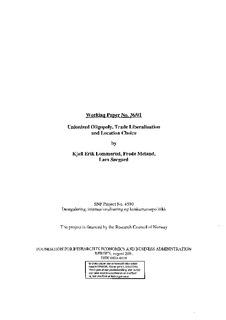| dc.contributor.author | Lommerud, Kjell Erik | |
| dc.contributor.author | Meland, Frode | |
| dc.contributor.author | Sørgard, Lars | |
| dc.date.accessioned | 2006-07-20T20:20:23Z | |
| dc.date.available | 2006-07-20T20:20:23Z | |
| dc.date.issued | 2001-08 | |
| dc.identifier.issn | 0803-4028 | |
| dc.identifier.uri | http://hdl.handle.net/11250/165840 | |
| dc.description.abstract | In a two-country reciprocal dumping model, with on country unionized, we analyze how wage setting and firm location are influenced by trade liberalization. We show that trade liberalization can induce a unionized firm to move all production abroad. This can not prevail in a corresponding, non-unionzed model. Trade liberalization ha a non-monotonic effect on wages. For a given location choice, trade liberalization increases national welfare in the unionized country. When a shift of some or all production to the foreign country occurs, national welfare can be reduced. | en |
| dc.format.extent | 1436315 bytes | |
| dc.format.mimetype | application/pdf | |
| dc.language.iso | eng | en |
| dc.publisher | SNF | en |
| dc.relation.ispartofseries | Working Paper | en |
| dc.relation.ispartofseries | 2001:36 | en |
| dc.title | Unionized oligopoly, trade liberalization and location choice | en |
| dc.type | Working paper | en |
